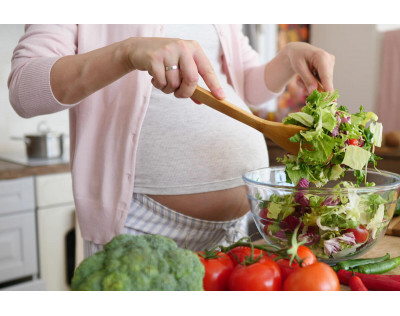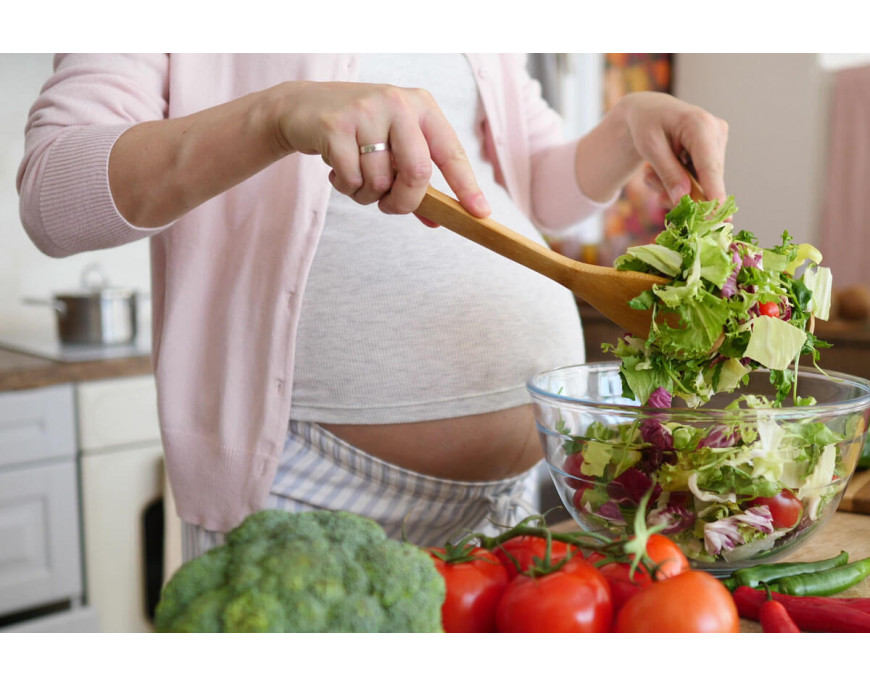Perfect care for mother and child
Perfect care for mother and child
With vitamins and nutrients
Pregnant women can usually not save themselves from well-intentioned nutrition tips, especially the adequate supply of vitamins and micronutrients is always an issue. But what do mothers and their unborn babies really need? What can be done without and what is possibly even dangerous? Our guide speaks plain language.
Don't eat for two
Most expectant mothers maintain a healthy lifestyle for the good of their child. Even if it is difficult, avoid alcohol and cigarettes during pregnancy, for example. It is now common knowledge that smoking and drinking cause serious harm to the unborn child.
However, the diet and weight of the pregnant woman also influence the development of the unborn child. It is best if the mother is of normal weight at the beginning of the pregnancy. Because both too many and too few pounds are unfavorable:
- Being underweight increases the risk of premature births, miscarriages and a low birth weight.
- Overweight can lead to gestational diabetes, high blood pressure and an increased risk of complications during childbirth. The children also suffer from their mother's excess weight. Most are born with an increased birth weight, and they are also at greater risk of becoming overweight themselves in the course of their lives.
Therefore: control your weight. Because even if a child is growing in the belly, pregnant women do not have to eat “for two”. In the second trimester, for example, the calorie requirement only increases by 250 kcal, in the third by around 500 kcal (500 kcal is about a bar of chocolate). And only if the pregnant woman continues to move as much as before.
The situation is different with micronutrients. Here the demand is increasing sharply in some cases. Nevertheless, in most cases a balanced diet is sufficient for adequate intake. But there are exceptions: all pregnant women should take folic acid and iodine separately. And in individual cases, iron or vitamin D are also required after medical advice.
Note : In women of normal weight, weight gain during pregnancy should be around 10 to 16 kg. How many pounds underweight and overweight women should or are allowed to put on must be clarified individually with the treating doctor.
Folate and folic acid for the brain One of the most important micronutrients for pregnant women is vitamin B9, folate (also called folic acid in synthetically produced form). Folate is not produced by humans and must therefore be taken in with food. The bioactive ingredient is methyl tetrahydrofolate (5-MTHF). Small amounts of it are already found ready-made in food; the greater part is converted in the intestine from various natural folate compounds. The synthetically produced folic acid must first be activated in the body, but this happens in the liver.
A folate deficiency (colloquially also folic acid deficiency) during pregnancy has serious consequences for the child. Particularly feared are neural tube defects such as spina bifida (open back) and anencephaly (open skullcap with the lack of parts of the brain in varying degrees), but also the jaw-palate cleft.
The need for folate increases by 83% on the first day of pregnancy. The basic requirement of adults is 300 µg folate equivalents and increases to 550 µg / day in pregnant women. (1 µg folate equivalent corresponds to about 1 µg dietary folate and 0.5 µg synthetic folic acid). Often these quantities cannot be reliably covered with food, which is why folic acid supplementation is recommended.
But not only the amount, but also the timing of folic acid supplementation is important. The child's neural tube is formed between the 19th and 28th day of development. In order to ensure that sufficient folate is available in the maternal organism during this sensitive time, the specialist societies recommend the following procedure in addition to a diet rich in folate to cover basic needs:
Cover the basic requirement of 300 µg folate equivalents through a diet rich in folate at least four weeks before a possible conception. In addition to protecting against neural tube defects, take 400 µg of folic acid as a synthetic preparation.
- The need for folate increases in the first trimester of pregnancy. The recommended 550 µg folate equivalents can be covered by a diet rich in folate. To prevent neural tube defects, 400 µg folic acid should be taken daily as a synthetic preparation throughout the first trimester of pregnancy.
- From the second trimester of pregnancy onwards, a targeted intake of folate through the diet can be sufficient; 550 µg folate equivalents are still required.
- 450 µg folate equivalents per day are recommended for breastfeeding women. This can also be achieved with foods rich in folates.
Note: Legumes, cabbage, green leafy vegetables, camembert, eggs and whole grain bread are particularly rich in folate equivalents. Important for vegetables: only steam them and do not keep them warm for too long so as not to destroy the micronutrients they contain.
Iodine: not too much and not too little
Iodine is essential for the production of thyroid hormones, and these in turn are essential for the healthy development of the child's brain and nervous system. An iodine deficiency during pregnancy therefore has serious consequences: both mental development and physical growth are reduced. This phenomenon is called cretinism and used to be seen more frequently in mountainous regions with a low iodine content, but too much iodine is not healthy because it stimulates the thyroid gland and threatens to overactive thyroid gland.
Germany is considered an area with mild to moderate iodine deficiency. For an adequate iodine intake, the German Nutrition Society (DGE) recommends iodized table salt and the consumption of milk and dairy products as well as sea fish. This also applies to pregnant women. However, their iodine requirement is even higher than that of non-pregnant women. You should therefore take 100 to 150 µg iodine / day as a supplement even with a balanced diet. In the case of pregnant women with thyroid disease, iodine intake must be discussed with the attending physician.
Note: Algae are also rich in iodine. Nevertheless, pregnant women should avoid them because their iodine content fluctuates greatly. In addition, algae are often contaminated with arsenic.
A hot iron ...
It is controversial whether pregnant women need additional iron. It is true that the child must also be supplied with it and the mother's need also increases due to the increased number of red blood cells due to pregnancy. On the other hand, menstruation is absent, so no blood is lost. Iron deficiency increases the risk of premature birth and low birth weight. However, there is evidence that excessive iron intake has the same negative effects. The recommendation for Germany is therefore: Regularly check the hemoglobin level during prenatal care and only add iron if there is an iron deficiency.
Tip: The absorption of iron can be improved by consuming foods rich in vitamin C at the same time, because vitamin C converts vegetable trivalent iron into bivalent iron and thus makes it more available.
Concern for eyesight
The omega-3 fatty acid docosahexaenoic acid (DHA) is important for the development of the brain and visual function. Pregnant women who do not regularly eat fatty sea fish should consume 200 mg DHA / day as recommended. Vitamin A also plays a major role in the development of the eye. In industrialized countries, however, an undersupply is rare, on the contrary: Here, excessive intake is problematic. Because vitamin A is teratogenic in the first 2 months after conception, daily doses of> 10,000 IU increase the risk of severe malformations. Routine supplementation with vitamin A is therefore not recommended during pregnancy, but instead a balanced diet with carrots, dairy products, eggs, green vegetables and tomatoes.
Note: The liver contains an average of 13-39 mg vitamin A per 100 g, corresponding to 44,000-130,000 IU. Calf's liver is particularly contaminated with up to 128 mg (corresponding to 420,000 IU) per 100 g. Therefore, especially in the first trimester of pregnancy, the consumption of liver, liver sausage and liver pate should be avoided.
Vitamin D
Vitamin D is supplied from the outside through food and is also produced by the body itself with the help of sunlight. In the unborn child, vitamin D promotes bone maturation and is essential for muscle contractions and nerve conduction. A vitamin D deficiency threatens bone structure disorders and lung diseases. 800 IU of vitamin D are recommended, but only for women who have no synthesis of their own, e.g. B. Women who are mainly indoors and / or wear full veils.
The supply of vitamin D is not without problems. Because it is fat-soluble, it cannot be excreted as easily in the event of an overdose. Doctors therefore only recommend vitamin D substitution if the deficiency is proven.
Without meat and without cheese ...
Pregnant vegetarians and vegans should consult their attending physician in depth about any necessary intake of micronutrients. In particular, the supply of vitamin B12, DHA, zinc, proteins, calcium and iodine can become critical due to your eating habits. An iron deficiency can be counteracted by consciously consuming legumes and whole grain products. If there is already an iron deficiency, iron must also be taken.
Source: Sabine Fischer, DAZ 2020, 31, p. 40; German Nutrition Society, Uniform recommendations for action for pregnancy updated and expanded, www. Dge.de, accessed on February 18, 2021


